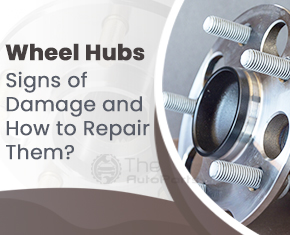Noise is the classic indicator that you have bad wheel bearings or hub bearings, but it can take a bit of investigating to find out why exactly damage has occurred. Bad wheel bearings can produce all sorts of weird sounds, so it is best to make note of everything you hear.
Driving with worn wheel bearings can result in severe damage to the drive-axle and steering assembly, and is ultimately a major safety hazard. The most basic mistakes, like using the wrong tools, can result in external or internal wheel end bearing damage. Two additional problems often left undiagnosed in repeated wheel bearing failures are the worn hub bearings and the transient current flowing through the axle.
If this is a front hub bearing, turning the wheel can make noises worse or changes in pitch. A damaged wheel hub assembly can also make your steering feel loose as you are driving along, making turns, or negotiating road imperfections. Simply listening to a cars wheel hubs when someone is driving it may reveal which ones are the worst.
Some of the most annoying noises that can emanate from a vehicle’s wheel well are those from bad hubs. Grinding, clanking, knocking, or popping sounds coming from the wheels may be an indication that the bearings are not working properly. If you are hearing clicking, or popping sounds coming from your wheels, it could indicate an issue with your bearings, usually related to incorrect mounting. If you hear (or sometimes even feel) grinding noises coming from your vehicle, these are usually the signs of a damaged wheel bearing.
If you are hearing strange, unusual sounds coming from the car as you drive, you could possibly be experiencing a wheel bearing failure. Hearing buzzing, clanking, squeaking, roaring, clicking, popping, popping, clanking, or knocking sounds is a common thing to happen if you have faulty wheel bearings. If you notice grinding or grinding noises coming from your wheels or tires, note that it is most likely caused by a bad wheel bearing — particularly if the noise gets louder when you speed up your car. The noise indicates rubbing metal against metal at high speed, and it comes from faulty bearings rubbing on their housings and worse, on the wheel hubs surrounding them.
It could actually be really unsafe to drive if one of your bearings is worn, particularly because it could make your wheels come off while you are driving. Usually located on a wheel hub, rotor, or brake drum, bearings help keep wheels spinning smoothly as a car moves — so if the cars owner reports hearing whirring or buzzing sounds when driving, or an ABS light comes on, chances are that a hub bearing needs a little care. When a wheel hub bearing assembly wears down, the results may range from annoying vibrations and wheel noises – to an issue with the ABS or the wheel literally breaking off as the car moves. Looseness, shaky steering or wheel vibration, and ABS system failures may also be signs of problems with the wheel bearings.
Wrapping It Up
When you discover a damaged wheel hub assembly, make sure it’s replaced with either OEM parts from your manufacturer or quality aftermarket replacement parts like The Auto Parts Shop that meet the same standards. Making sure your vehicle is running on healthy wheel hub assemblies is a vital part of keeping your vehicles – and you – safe on the road.
